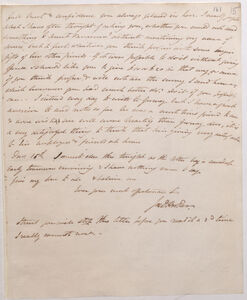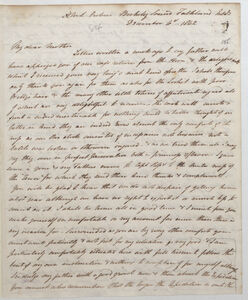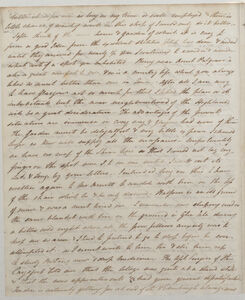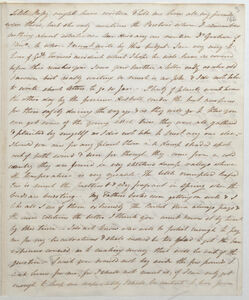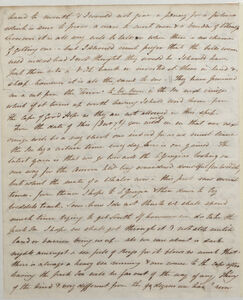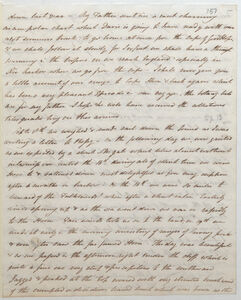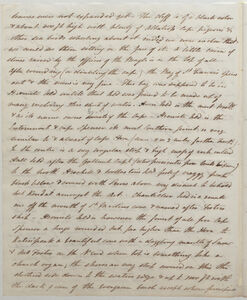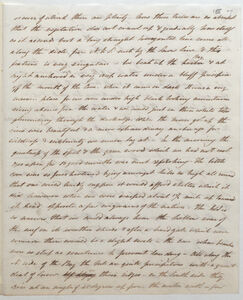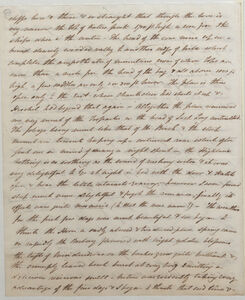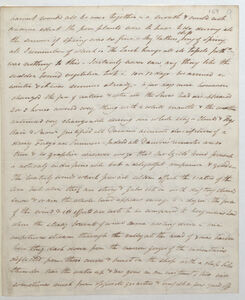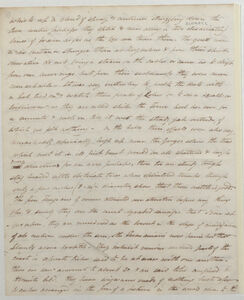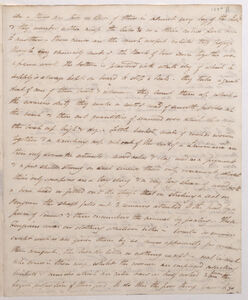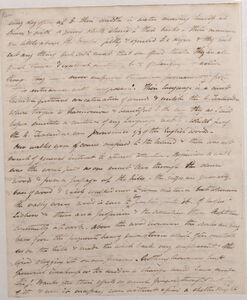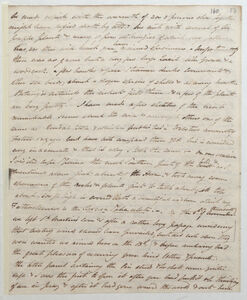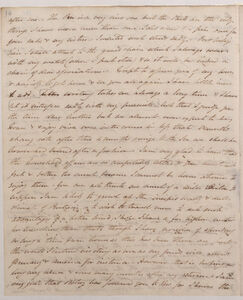Transcript
full trust & confidence you always placed in her. I nearly forgot what I have often thought of asking you, whether you could not send something to Aunt Vavasour? Without mentioning my name of course, but to put whatever you think proper with some larger gifts of her other friends -- If it were possible to do it without giving offence I should like you to give £10 or £20 in that way, or more if you think it proper, & will not use the money I send home, which however you had much better do. Do it if you possibly can. I intend every day to write to Gurney*7 but I have a great aversion to send notes so for he was a most kind friend to me & none wished [me well more heartily than Gurney does, it is a very delightful thing to think that he is giving every satisfaction to his employers & friends at home.
Dec[embe]r. 15th. I must close this tonight as the letter bag is sewed up early tomorrow morning & I have nothing more to say[.]
Give my love to all & believe me | Ever your most affectionate son | Jos. D. Hooker.[signature]
I trust you will stop this letter before you read it a 2nd time. I really cannot now.
H.M.S Erebus Berkley Sound Falkland Isl[an]ds
December 6th ..1842.
My dear Mother [Lady Maria Hooker],
Letters written a week ago to my father will have apprized you of our safe return from the Horn & the delight with which I received your very long & most kind epistles I shall therefore only thank you again for them as also for the locket with poor Willy's*1 hair & the many other little tokens of affectionate regard all of which are very delightful to receive.-- The cask with carrots & fruit is indeed inestimable for nothing could be better thought of or better in kind. They are indeed now almost the only comforts of the mess as our Rio [de Janeiro] stock consisted of necessaries not luxuries: not a bottle was broken or otherwise injured & as we tried them all! may say they were in perfect preservation both in firmness & flavour. I gave some in your & my Father's name to Capt. Ross & the mates mess of the "Terror" for which they send their kind thanks & compliments. You will be glad to hear that we do not despair of getting home next year although we have no right to expect it or much less to count on it. I shall be home all in good time & I much fear you make yourself uncomfortable on my account far more than there is any occasion for -- surrounded as you are by every other comfort you must wait patiently & not fret for my situation is very good & I am particularly comfortably situated here with full license to follow the beat of my own inclination & nothing to complain of for myself although I indulge my father with a good growl now & then about the Expedition you must also remember that the longer the Expedition is out the
better it is for me as long as my time is well employed & there is little chance of want of work in this ship if I could only do it better. I often think of the nice house & garden of which it is easy to form a good idea from the excellent sketches Fitch has done & indeed until they arrived for nearly 1/2 year I continued to wonder & wonder what sort of a spot you inhabited -- Being near Aunt Palgrave is also a great comfort to you & so is a country life which you always liked so much better than one in town. After all I am sorry to leave Glasgow not so much for that I liked the place or its inhabitants but the near neighbourhood of the Highlands will be a great desideratum. The advantages of the present situation are immense in every way & Glasgow had none of them. The garden must be delightful & very little expense I should hope as Kew will supply all the necessaries -- Unfortunately we have no map of the shire here so that I could not lay my finger on the spot were I to see one until I work out its Lat[itude]. & long[itude]. by your letters. I intended long ere this to have written again to Mr Arnott to condole with him on the loss of the chair which he & he only received. Balfour is an old friend of mine & was a most kind one -- I remember once sleeping under the same blanket with him on the ground in Isla during a bitter cold night when all the poor fellows anxiety was to keep me warm & I had to pretend to go to sleep before he ever attempted it. So I must write to him too & stir him up to study Botany now & drop medicine. The Ass[istan]t. Surgeon of the Carysfort told me that the College was quite at a stand still & that the new appointments &c had given general dissatisfaction. London is certainly getting far ahead of it & Edinburgh always was
Little Bessy*2 might have written & told me how all my friends were there, but she only mentions about the Prestons whom I remember nothing about whatever. Nor does anyone mention Dr. Graham of Edinb[urgh]. to whom I must write by this budget. I am very sorry to hear of Gr[an]d[fathe]r Turner's*3 accident which I hope he will have recovered from before this reaches you I owe your Mother a letter sadly as also old Dawson but really writing so much is no joke & I do not like to write short letters to go so far. Plenty of plants went home the other day by the Governor Hackett[?] under the best auspices for their safety during this voyage & as they will go to Kew you can get some of the young beech trees, they were all gathered & planted by myself as I did not like to trust any one else. Should you care for any plant them in a damp shaded spot out of both wind & sun for though they come from a cold Country they are formed in very sheltered damp valleys where the temperature is very agreeable -- the little crumpled leafed tree is much the prettiest & very fragrant in Spring when the buds are bursting. My Father's books seem getting on well & I like all I see of them extremely the British Flora always pays & the more editions the better I think you must know it by heart by this time. I do not know who will be foolish enough to pay me for my lucubrations & shall indeed be too glad to get the bare expenses covered, as to making money that will be out of the question. I wish you would not lay aside the few pounds took home for me, for I shall not want it, if I can only get enough to keep me respectably I shall be content to live from
hand to mouth & I would not give a penny for a fortune which is sure to prove a curse to most men & a breeder of idleness. However it is all very well to talk so when there is no chance of getting one -- but I should much prefer that the bills were used indeed had I not thought they would be I should have put them into a V[an]. D[iemen's]. L[and]. bank or invested it there in land & sheep -- however it is all the same to me. They have promised me a cat from the 'Terror' to be born in the ice next cruize[sic] which it if turns up worth having I shall send home from the Cape of Good Hope as they are not allowed in this ship.
From the date of this (Dec. 7th) you will see see[sic] that our next cruize will be a very short one indeed for as we must leave the ice by a certain time every day here is one gained. The latest yarn is that we go towards the S[outh]. Georgias looking on our way for Aurora Isl[an]ds long considered doubtful (see Weddell) but which the mate of a whaler now in this port saw several times -- from thence I hope to S. Georgia & then down to try Weddel's track. Somehow I do not think we shall spend much time trying to get South. If however we do take the pack ice I hope we shall get through it & not stop until land or barrier bring us up -- all we care about is dark nights amongst a sea full of Bergs for it blows so much that there is always a heavy sea running & our course to the Cape after leaving the pack ice will be far out of the way of any thing of the kind & very different from 90 degrees we have had to run
down last year. -- My Father sent me a most charming circumpolar chart which Davis is going to have ready with our next summers track to go home at once from the Cape of Good Hope & we shall follow it slowly for I expect we shall have a thorough warming in the Tropics ere we reach England especially in Rio harbor -- where we go from the Cape -- I shall now give you a little account of our cruize to Cape Horn & back again which has been a very pleasant episode in our voyage, the botany lists are for my Father -- I hope he will have received the collections talis qualis *4 long ere this arrives.
Sept[embe]r 9th we weighed & made sail down the sound as I was writing a letter to Bessy -- on the following day we were greeted as we expected by a stout S.W. gale which blew almost without interruption until the 16th during all of which time we were hove to & battened down most delightful as you may suppose after 4 months in harbour -- On the 16th we were 80 miles to leeward of the Falklands! when after a short calm Easterly wind sprung up & as the sea went down we ran on rapidly to the Horn. Fair winds took us on to the land; on 19th we made it early in the morning consisting of ranges of snowy peaks & soon after saw the far famed Horn. The day was beautiful & so we passed in the afternoon right under the cliff which is quite a fine one very steep & precipitous to the southward[.] Jagged & peaked at the top covered with very stunted brush wood of the crumpled or deciduous leaved bush which was brown as the
leaves were not expanded yet. The cliff is of a black colour & about 600 ft high with plenty of albatross[,] cape pigeons & other sea birds wheeling about it indeed we were so close we would see them sitting on the face of it. A little cairn of stones raised by the officers of the Beagle is on the top of all -- After rounding (or doubling the Cape) the Bay of St. Francis opens out & the view is very fine. This bay was supposed to be in Hermite Isl[an]d until that Isl[an]d was found to be made up of many enclosing this sheet of water. Horn Isl[an]d is the most West[war]d & as its name owns boasts of the Cape. Hermite is the Eastern most & Cape Spencer its most Southern point is very similar to & abreast of Cape Horn (some 2 or 3 miles farther north). In the centre is a very singular steep mass of rock called Hall Isl[an]d -- after the gallant Capt. (who persecutes poor midshipmen) to the North Herschell & Wollaston's Isl[an]ds full of craggy peaks black below & covered with snow above very dismal to behold Mt Kendal amongst the rest. Chanticleer Isl[an]d is a small one off the mouth of St. Martin's Cove & named after Foster's ship -- Hermite Isl[an]d is however the finest of all from Cape Spenser[sic] a huge rounded Mt far higher than the Horn to Kater's Peak a beautiful cove with a dazzling mantle of snow & Mt Foster on the N[orth]. end whose top is something like a church organ; the shores are very steep covered on this the sheltered side down to the water's edge & up to 1000 ft with the dark green of the Evergreen beech except where precipices
occur of which there are plenty. Now these hills are so abrupt that the vegetation does not crawl up & gradually loose itself as it ascends but a long straight horizontal line runs along the side from N. to S. met by the Snow line & this feature is very singular -- we beat up the harbor Bay & at night anchored in very deep water under a steep precipice off the mouth of the cove. When it came on dark it was a very curious place for we were under high black looking mountains rising at once from the water & we could just see their white tops glimmering through the darkness, when the moon got up the view was beautiful & a more extraordinary anchorage for wildness & sublimity we never lay at. In the morning the quietness of the spot & the green woods which we had not cast eyes upon for 12 good months was most refreshing. The little cove was foreshortened lying amongst hills so high all round that one could hardly suppose it would afford shelter which it did however when we were washed about 1 1/3 mile up towards its head opposite a few wigwams of the natives. The Isl[an]d is so narrow that we could always hear the hollow roar of the surf on its weather shores & after a hard gale which were common there would be a slight swell in the cove whose beaches were so steep as sometimes to prevent landing -- all along the N. side of the Bay the Mts are quite precipitous with a great deal of snow on their ridges. On the south side they rise at an angle of 45 degrees up from the water with a few
cliffs here & there & so straight that though the cove is very narrow the top of Kater's peak 1700 ft high is seen from the ships when in the centre -- The head of the cove runs up in a broad densely wooded valley to another ridge of hills which completes the amphitheatre of mountains none of whose tops are more than a mile from the head of the bay & all above 1000 ft high a few saddles are only 2 or 300 ft. lower. The place is thus open only to the East where Chanticleer Isl[an]ds shuts it up & Herschel beyond that again. Altogether the place reminded me very much of the Trossachs or the head of Loch Long contracted. The foliage being much like that of the Birch & the steep mountain torrents keeping up a continual roar which often put me in mind of many a night spent in the Highlands nothing is so soothing as the sound of rushing water & it was very delightful to be at night in bed with the door & hatch open & hear the little cataracts roaring, however I soon found sleep much more delightful & forgot the romance, -- finally its effects were quite mesmeric (is that the new name?) -- The weather for the first few days was most beautiful & we began to think the Horn a sadly abused & traduced place spring came on rapidly the Berberry flowered with bright golden blossoms, the tufts of liriodendrons on the beaches grow quite brilliant & the crumply leaved beech burst at every twig emitting a delicious resinous smell -- nature was evidently taking every advantage of the fine days & I began to think that seed time &
harvest would all be over together in a month & could not conceive what the poor plants were to have to do during all the summer if the spring was so fine -- My Father's class song of Spring, all of which I remember is " The larch hangs all its tassels forth" was nothing to this. I certainly never saw anything like the sudden bound vegetation took in 10 or 12 days we arrived in winter & it was summer already -- a few days more however changed the face of nature & after all the Snow had disappeared 2 or 3 hours covered every thing with a white mantle & this continued very changeable during our whole stay -- clouds & fogs, rain & snow justified all [Charles] Darwin's accurate descriptions of a dreary Fuegian summer. Indeed all Darwin's remarks are so true & so graphic wherever we go that Mr Lyell's kind present is not only indispensible but a delightful companion & guider. The westerly winds which prevail seldom affect the waters of the cove but where they are strong & gales set in with drifting clouds & snow & rain the whole land appears savage to a degree. The force of the wind & its effects are not to be compared to Kerguelen's Land where the steady torrent of wind came rushing down in one impetuous stream through the valley at the head of Xmas harbour here they dart down from the narrow gorges of the mountains deflected from this course & burst on the ship with a clap like thunder tear the water up & are gone in an instant; two will sometimes meet from opposite directions & impact a few yards off
whisk up a cloud of spray & continue struggling down the cove until perhaps they split & run away in two disavicating divaric *5 lines of foam as far as the eye can trace them. The gusts were in no instance stronger than at Kerguelens & from their short duration do not bring a strain on the cables or cause us to drift from our moorings but from their suddenness they were more remarkable -- it was very interesting to walk the deck with a hat tied on & watch these freaks of Aeolus*6 or to see a squall or williewaw as they are called strike the Terror[,] keel her over for a minute & rush on till it met the steady gale outside, of which we felt nothing -- on the hills their effects were also very remarkable especially high up near the gorges where the trees which met it in its first burst would be all shattered & lay in every direction for an acre perhaps, these there too are sturdy tough stag headed little obstinate trees whose splintered trunks though only a few inches (8-14) in diameter, show that their mettle is good. The poor Fuegians of course attracted our attention before anything else & surely they are the most degraded savages that I ever set eyes upon, they are considered as the lowest in the stage of civilisation of all nations under the sun, the Tasmanians now banished that Island alone accepted -- They inhabit various scattered parts of the coast in separate tribes said to be at war with one another. These we saw amount to be about 20 & are said to be confined to Hermite Isl[an]d. They have wigwams made of nothing but a few branches arranged in the form of a beehive in the wood close to the
sea -- there are two or three of these in almost every bay of the [Isl[an]ds. & they wander either across the hills or in their canos[sic] from one to another. These canos are the most useful articles they possess though very clumsily made of the bark of trees sewn together over a frame work the bottom is plastered with white clay of which a supply is always kept on board to stop a leak -- they take a great deal of care of these boats & whenever they hawl[sic] them up which is the womens['] duty they make a sort of road of smooth pebbles up the beach & then cut quantities of seaweed over which they drag the boat up high & dry. Little baskets made up of rushes woven together & a drinking cup cut out of the root of a Laminaria are their only domestic utensils, wood ashes & clay used as a pigment & a few shells strung on seal sinew is their only ornament, whilst their only weapons are a long sling & a very long spear of wood with a bone head so fitted on to the shaft that on striking a seal or penguin the shaft falls out & remains attached to the head by a piece of sinew & this encumbers the animal by floating. These Fuegians wear no clothing whatever either in winter or summer except such as are given them by us more apparently for ornament than comfort. The men do little or nothing except seal or such like comes in their way whilst the women are employed collecting limpets & muscles which eaten raw or half cooked & form the largest proportion of their food, to do this the poor things have to go
every day often up to their middles in water snowing heavily at times & with a young child slung to their backs. Their manners are little above the brutes, filthy & squalid to a degree & they will eat anything but salt meat that we offered them. They are all great thieves & excellent imitators both of language & action though they have never improved themselves permanently from their intercourse with Europeans. Their language is a most horrible guttural concatenation of sounds & unlike the N[ew]. Zealanders whose tongue is harmonious & beautiful to the ear they as I said before imitate a sentence of any language readily -- whilst few of the N. Zealanders can pronounce 1/3 of the English words. -- Our walks were confined to the Island & there was not much of general interest to attract attention. Beginning a walk was the worst part as one must tear through the dense woods & force a passage up the hills -- the ridges are generally bare of wood & easily walked over to some distance but whenever the valley curves wood is sure to be packed into it. Of mosses lichens etc. there are a profusion & the collecting [of] them kept me constantly at work. Above the wood however the rocks are very bare from the frequent heavy snow storms which often over took us on the hills & made the walk back very unpleasant the wind clogging[?] it in on our persons. Nothing however but personal weakness or too sudden a change could have made Sir J. Banks feel their effects so much for we though nothing of it & were it necessary even without a fire a shelter might
be made which with the warmth of 2 or 4 persons close together might have defied death by cold. We met with several of Sir Joseph's plants & many of poor old Menzies['] of which my Father has will ere this will reach you have received specimens. Unfortunately there was no game but a very few large quail like grouse & a woodcock, a few hawks & geese[,] steamer ducks[,] cormorants & other sea birds; about a dozen species of shells & as many insects. Botany is certainly the richest field there -- & a few of the plants are very pretty. I have made a few sketches of the most remarkable scenes about the cove & amongst others one of the same as Kendal took & which is published in Webster's account of Foster's voyage but have not compared them yet his is considered very inaccurate & that is why I took the same. -- On one occasion I visited Cape Spencer the most Southern part of the coast Isl[an]d. & as I mentioned above just abreast of the Horn, & took away some specimens of the rocks & plants just to talk about; its top about 600 ft. high is covered with a beautiful Lichen which my Father knows is the Usnea sphacelata. -- On the 6th of November (or thereabouts) we left St. Martin's Cove & after a rather long passage considering that Westerly winds should have prevailed, but did not when they were wanted we arrived here on the 13th & before anchoring had the great pleasure of receiving your kind letters & presents. The little haul containing the pin studs & the Lockets came quite safe & I was the first to open it after you had put it up thinking of me in Jersey & after it had gone round the world & out here
after me. The pin is a very nice one but the studs are the only things I have worn more than once. I did wear the pin once for your sake & my sisters. I wanted such studs sadly -- Poor Willy's hair I shall attach to the guard chain which I always wear with my watch (when I put it on) & so it will be indeed be a chain of dear associations. Except to assure you of my love & anxiety to get home & see you all again I have little more to add. Letter writing takes me always a long time & I have let it interfere sadly with my pursuits. Not that I grudge you the time dear Mother but we almost now expect to be home & enjoy viva voce intercourse in less than 5 months at any rate after this 4 months cruise to the Ice we shall be homeward bound after a fashion. I am very glad to hear that the household affairs are so comfortably settled & you must not fret & bother too much because I cannot be home at once to enjoy them. You can not think me much of a sailor & Briton to suppose I am likely to growl at the insipid society & dull climate of Britain or to wish to travel more to seek such advantages of a better kind. I hope I have a far higher motive for travelling than that, though I have no idea of spending so long a time from home as this has been there are parts of the world I intend visiting as soon as my funds will allow Germany & America for instance -- However that is looking a long way hence & some many months after my return. I am very glad that Betsey has followed you to Kew for I know the
full trust & confidence you always placed in her. I nearly forgot what I have often thought of asking you, whether you could not send something to Aunt Vavasour? Without mentioning my name of course, but to put whatever you think proper with some larger gifts of her other friends -- If it were possible to do it without giving offence I should like you to give £10 or £20 in that way, or more if you think it proper, & will not use the money I send home, which however you had much better do. Do it if you possibly can. I intend every day to write to Gurney*7 but I have a great aversion to send notes so for he was a most kind friend to me & none wished [me well more heartily than Gurney does, it is a very delightful thing to think that he is giving every satisfaction to his employers & friends at home.
Dec[embe]r. 15th. I must close this tonight as the letter bag is sewed up early tomorrow morning & I have nothing more to say[.]
Give my love to all & believe me | Ever your most affectionate son | Jos. D. Hooker.[signature]
I trust you will stop this letter before you read it a 2nd time. I really cannot now.
1. William Dawson Hooker (1816 -- 1840). Joseph Hooker's older brother, he was also a doctor and naturalist. He went to Jamaica in the interests of his health but soon died there of yellow fever. He was married to Isabella Whitelaw Smith who had their child, Willielma Dawson Hooker, after William's death.
2. Elizabeth 'Bessy' Evans-Lombe née Hooker (1820--1898). Joseph Hooker's sister.
3. Dawson Turner (1775--1885). Joseph Hooker's maternal grandfather. Banker, botanist and antiquarian. Author of a number of books on botany he later changed his focus to antiquities and collaborated with the artist John Sell Cotman on the book Architectural Antiquities of Normandy (1822).
4. Latin phrase meaning 'such as it is'.
5. An annotation of 'divaric' has been added above the misspelled word 'disavicating'.
6. Aeolus was ruler of the winds in Greek mythology.
7. Gurney Turner (1813--1848). Third son of Dawson Turner, brother of Maria Hooker and Elizabeth Palgrave (both nee Turner), uncle of Joseph Dalton Hooker.
Please note that work on this transcript is ongoing. Users are advised to study electronic image(s) of this document where possible.
Powered by Aetopia
